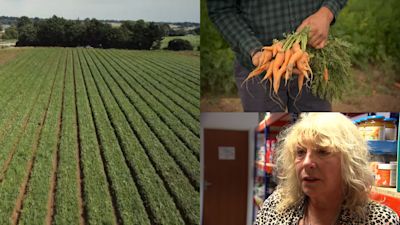Insight
The food left to rot instead of feeding low-income families 'after government funding change'

Wonky vegetables are being wasted because it's cheaper to let them rot at farms than to transport them to charities, ITV News Deputy Political Editor Anushka Asthana reports
At a bustling warehouse in Bristol belonging to the food distribution charity Fareshare, there are serious worries about the unfolding situation. Deep into the summer holidays, they are facing soaring demand for food banks and pantries that are helping struggling families get by.
But the charity has told ITV News that nationally it is now experiencing a massive 30% decline in supplies of food, including much-needed fresh produce.
Dressed in a high-vis vest, as volunteers pack up crates and lift them into vans around her, Lucy Bearn - director of operations for Fareshare in the south west, is blunt about the problem.
"That food is out there, the problem is that it is cheaper for farmers to currently waste their edible surplus food than send it to charities like ours," she said, revealing that a huge government grant to try to fix this problem has ended this year.
How fresh fruit and veg is going to waste despite overwhelming demand at the nation's food banks
Fareshare, which is the country's largest food redistribution charity, thinks the lack of new government money is exacerbating their supply problems at a time when families continue to be squeezed by the pandemic.
New statistics underline the scale of the problem. Reports published this summer by the charity WRAP suggest there could be 1.6 million tonnes of food waste generated on farms each year - 3.2% of all food production.
It is hard to estimate how much of that could be redistributed to other uses - such as to food charities - but the figure could be as high as 330,000-360,000 tonnes, according to researchers.
Kim, sole guardian to two grandchildren and user of Action Pantry in Bath, says the government's decision not to renew the grant is "disgusting"
In 2019/20, the Department for Environment, Food and Rural Affairs (Defra) ran a £15m pilot that gave money to charities to try to solve this by paying for the surplus, edible food to be transported and used for hungry families. Fareshare was handed £1.9m. Money was also distributed to several charities through WRAP, including to one in London called City Harvest.
The money was a major contributor to an increase in redistribution in 2020 according to Wrap, with almost 7,000 tonnes of food – equivalent to 20 million meals – diverted from farms. That was a 2.5 fold increase from under 3,000 tonnes the year before.
Among the farms City Harvest helped to redistribute food from was the James Foskett farm in Suffolk. When we visited it, we saw the reality of this problem. Row upon row of beetroots and carrots had been discarded into the ground because they were considered too small or large, too misshapen or too damaged for supermarkets - despite the fact that most of them looked completely edible.
Nikola Tonev, the farm's organic manager, said it was too expensive to redistribute that food alone but with City Harvest's help to pay for haulage and some farm workers volunteering their time - they had been able to send some crates to the charity each week.
Lucy Bearn from FareShare said "millions of meals worth" of food could be going to people in need
They could do much more. Given that up to 20% of vegetables can be discarded in a typical year, Tolev said that in just one field, 80,000 bunches of beetroots could be redistributed.
But even the money they are getting is now running out as the grants given to both Fareshare and City Harvest run out, with no current plans from the government to extend the pilot.
David Carter, the CEO at City Harvest, said there were incentives to send food to anaerobic digestion plants and to feed animals but he wanted more focus "further up the food chain" on feeding people who are hungry. He said more funding could help pay for transport and haulage.
"And we could benefit from that hugely because we would either go to farms or farmers could bring food to us," he said.
We saw food being wasted because it was too wonky or the wrong size. Wrap said that and other reasons contributed to food waste such as weather, soil type, variety selection and pests.
The charities ITV News spoke to said the grants from the government had helped them pay for active costs like the haulage to transport the food from farms, and that the money they received has now run out.
That leaves them needing to fundraise themselves or close activities down. But a spokesperson for Defra said: “Our priority is to prevent food waste occurring in the first instance, and where waste cannot be prevented, edible food surplus should be redistributed.”
Sources pointed to the fact that hundreds of charities had benefited from the grants - with some of the money still being paid out. While admitting that there were no plans for new grants, they said there were examples of the money being used to put infrastructure support in place - like additional warehousing and fridges and freezers - that meant projects would continue to help for many years to come.
The spokesperson said they also continued to support WRAP and its work through the Courtauld Commitment 2030 - a voluntary agreement that tries to help farmers, growers and agri-businesses reduce carbon, water and waste.